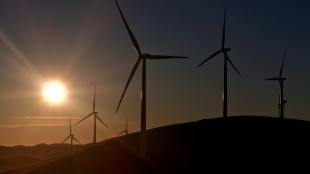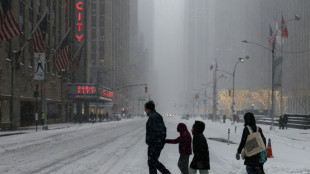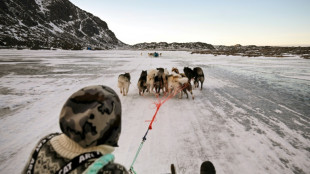
-
 Back to black: Philips posts first annual profit since 2021
Back to black: Philips posts first annual profit since 2021
-
South Korea police raid spy agency over drone flight into North

-
 'Good sense' hailed as blockbuster Pakistan-India match to go ahead
'Good sense' hailed as blockbuster Pakistan-India match to go ahead
-
Man arrested in Thailand for smuggling rhino horn inside meat

-
 Man City eye Premier League title twist as pressure mounts on Frank and Howe
Man City eye Premier League title twist as pressure mounts on Frank and Howe
-
South Korea police raid spy agency over drone flights into North

-
 Solar, wind capacity growth slowed last year, analysis shows
Solar, wind capacity growth slowed last year, analysis shows
-
'Family and intimacy under pressure' at Berlin film festival

-
 Basket-brawl as five ejected in Pistons-Hornets clash
Basket-brawl as five ejected in Pistons-Hornets clash
-
January was fifth hottest on record despite cold snap: EU monitor

-
 Asian markets extend gains as Tokyo enjoys another record day
Asian markets extend gains as Tokyo enjoys another record day
-
Warming climate threatens Greenland's ancestral way of life

-
 Japan election results confirm super-majority for Takaichi's party
Japan election results confirm super-majority for Takaichi's party
-
Unions rip American Airlines CEO on performance

-
 New York seeks rights for beloved but illegal 'bodega cats'
New York seeks rights for beloved but illegal 'bodega cats'
-
Blades of fury: Japan protests over 'rough' Olympic podium

-
 Zelensky defends Ukrainian athlete's helmet at Games after IOC ban
Zelensky defends Ukrainian athlete's helmet at Games after IOC ban
-
Jury told that Meta, Google 'engineered addiction' at landmark US trial

-
 Despite Trump, Bad Bunny reflects importance of Latinos in US politics
Despite Trump, Bad Bunny reflects importance of Latinos in US politics
-
Star Copper to Deploy Advanced Deep-Penetrating 3D IP to Expedite 2026 Drill Program

-
 Apex Mobilizes Second Drill Rig and Provides Phase I Update at the Rift Rare Earth Project in Nebraska, U.S.A.
Apex Mobilizes Second Drill Rig and Provides Phase I Update at the Rift Rare Earth Project in Nebraska, U.S.A.
-
Noram Fully Funded for 2026 and Engages GRE to Update PEA With Multiple High-Value Critical Mineral Byproduct Credits

-
 Gaming Realms PLC Announces FY25 Pre-Close Trading Update
Gaming Realms PLC Announces FY25 Pre-Close Trading Update
-
Caledonia Mining Corporation Plc - Issue of Securities Pursuant to Long Term Incentive Plan Awards

-
 Hemogenyx Pharmaceuticals PLC Announces Issue of Equity
Hemogenyx Pharmaceuticals PLC Announces Issue of Equity
-
How Fort Myers Dentists Create Long-Term Care Plans for Healthy Smiles

-
 Nikon Introduces the ACTION and ACTION ZOOM Binoculars
Nikon Introduces the ACTION and ACTION ZOOM Binoculars
-
Australian PM 'devastated' by violence at rally against Israel president's visit

-
 Vonn says suffered complex leg break in Olympics crash, has 'no regrets'
Vonn says suffered complex leg break in Olympics crash, has 'no regrets'
-
YouTube star MrBeast buys youth-focused banking app

-
 French take surprise led over Americans in Olympic ice dancing
French take surprise led over Americans in Olympic ice dancing
-
Lindsey Vonn says has 'complex tibia fracture' from Olympics crash

-
 US news anchor says 'hour of desperation' in search for missing mother
US news anchor says 'hour of desperation' in search for missing mother
-
Malen double lifts Roma level with Juventus

-
 'Schitt's Creek' star Catherine O'Hara died of blood clot in lung: death certificate
'Schitt's Creek' star Catherine O'Hara died of blood clot in lung: death certificate
-
'Best day of my life': Raimund soars to German Olympic ski jump gold

-
 US Justice Dept opens unredacted Epstein files to lawmakers
US Justice Dept opens unredacted Epstein files to lawmakers
-
Epstein taints European governments and royalty, US corporate elite

-
 Three missing employees of Canadian miner found dead in Mexico
Three missing employees of Canadian miner found dead in Mexico
-
Meta, Google face jury in landmark US addiction trial

-
 Winter Olympics organisers investigate reports of damaged medals
Winter Olympics organisers investigate reports of damaged medals
-
Venezuela opposition figure freed, then rearrested after calling for elections

-
 Japan's Murase clinches Olympic big air gold as Gasser is toppled
Japan's Murase clinches Olympic big air gold as Gasser is toppled
-
US athletes using Winter Olympics to express Trump criticism

-
 Japan's Murase clinches Olympic big air gold
Japan's Murase clinches Olympic big air gold
-
Pakistan to play India at T20 World Cup after boycott called off

-
 Emergency measures hobble Cuba as fuel supplies dwindle under US pressure
Emergency measures hobble Cuba as fuel supplies dwindle under US pressure
-
UK king voices 'concern' as police probe ex-prince Andrew over Epstein

-
 Spanish NGO says govt flouting own Franco memory law
Spanish NGO says govt flouting own Franco memory law
-
What next for Vonn after painful end to Olympic dream?


2023's record heat partly driven by 'mystery' process: NASA scientist
It's no secret human activity is warming the planet, driving more frequent and intense extreme weather events and transforming ecosystems at an extraordinary rate.
But the record-shattering temperatures of 2023 have nonetheless alarmed scientists, and hint at some "mysterious" new processes that may be under way, NASA's top climatologist Gavin Schmidt tells AFP.
The following are excerpts from an interview with Schmidt:
- Can you put what we saw in 2023 into perspective? -
It wasn't just a record. It was a record that broke the previous record by a record margin.
We started with La Nina, this cool phenomenon in the tropical Pacific. That was still around until March. And then in May, we started to see the development of an El Nino, the warm phase of that cycle.
It normally affects the temperatures in the following year. So that would be 2024. But what we saw in 2023 was that the temperatures globally seemed to go up with the El Nino event, in a much greater way than we'd ever seen it before.
The long term trends we understand, and it's being driven by the greenhouse gases, it's being driven by anthropogenic effects. We're expecting that to continue, decade by decade, until we stop emitting greenhouse gases into the atmosphere, which we haven't done yet.
But what happened in 2023 was that, and then plus something. And that 'plus something' is much larger than we expect, or as yet can explain.
- What are the leading hypotheses for that 'plus something'? -
There have been emails and conversations going on around the world, among the scientists who are looking at this, and people say, 'Oh, let's look at the Earth's energy imbalances. Let's look at the aerosols, let's look at the El Nino, at what's happening in the Antarctic, in the North Atlantic.' And everybody has lots of ideas, but it doesn't quite add up.
It may be that El Nino is enough. But if I look at all of the other El Ninos that we've had, none of them did this. So either this El Nino is really super special, or the atmosphere is responding to this El Nino in a very special way. Or there's something else going on. And nobody has yet really narrowed these possibilities.
That long-term trend is still within the bounds of what we've been predicting for many years. But the specifics of what happened in 2023 are a little mysterious.
- What should we expect for 2024? -
It matters why 2023 was the way it was, because does that mean it's going to continue? Does that mean the impacts are going to start to accelerate? We don't know! And that's problematic.
2023 did not follow the old patterns. If the old patterns come back, and 2023 was just a blip, then 2024 will be very close to 2023. If it's not a blip, if it's something systematic that's changed, or that's changing, then you would expect 2024 to actually be warmer. Because you have the warmth that you would expect, and then there's this extra thing.
And that has implications for the weather, and heat waves, and intense rainfall, and coastal flooding, and all the rest of it, that we can expect this year.
H.E.Young--AMWN